- Home
- Mark Hodder
A Red Sun Also Rises Page 12
A Red Sun Also Rises Read online
Page 12
The beak of every crow mask in the chamber turned to point in my direction.
“It is not your place to object,” Reverie said. “And in future, I advise you to speak only when you’re spoken to.” He turned back to Yissil Froon. “Very well, it shall be as you advise.”
My mouth worked but no further words emerged. I was shocked. No one had ever before addressed me in such a fashion.
Mademoiselle Crockery Clattersmash, responding to a gesture from Reverie, moved out of the pews and approached us. She’d taken only a few steps when she suddenly reeled to one side and collapsed against a pillar, which she clutched at for support. A low moan sounded from behind her mask.
“Mademoiselle?” said Reverie, moving down from the lectern. “Are you unwell?”
“Yes,” came the weak response. “No. Just a little dizzy. I shall be fine.” She straightened, shook her head slightly, and stepped over to us.
“Come,” she said, and led us out of the room, from the temple, and into the street. It immediately became apparent that while we’d been inside, New Yatsillat had expanded even more.
° °
We were given a large empty house on the city’s fourth level, situated at the edge of a quiet little square with a fountain at its centre. Three steps led to our double front doors, which opened onto a very spacious vestibule that gave access to five big, rectangular ground-floor chambers. A steep ramp sloped up the right-hand wall to the upper floor, on which there were six more rooms. The property was plumbed, and most of the rooms had a fireplace.
Mademoiselle Clattersmash told us we’d have plenty of time to settle in and sleep before commencing our training. She left, but we’d only just closed the door behind her when there came a knock upon it and we found ourselves in the presence of three plain-masked Workers—a furniture maker, a tailor, and a grocer. Each asked what we required, and it quickly became apparent to us that the provisions would be free of charge, for the concept of money was totally lacking in the Yatsill.
Adopting the philosophy that we might as well make ourselves as comfortable as possible as quickly as we could, we ordered from the furniture maker tables and chairs, beds, desks, sofas, armchairs, sideboards, armoires, bureaus, and a great many other things, every one of which had to be described in meticulous detail.
The tailor measured us from head to toe. I asked him to make me a black three-piece suit, top hat, and button-up boots. The latter had him bemused until I showed him my feet and described how they should be shod. Once he’d understood the concept, he was confident he could deliver and enthused about adapting the idea for Yatsill feet—though they weren’t really feet at all, being more the pointed ends of the four legs. With regard to the suit and topper, he shook his head and mumbled through his mask, “No, mate. This ain’t for the likes of you.”
“What do you mean?” I asked.
“You’re a Servant. It ain’t seemly for you to sport togs like this.”
Clarissa pulled me to one side. “Just to keep the peace while they’re judging us, you’ll have to pose as my Servant.”
“Have I plummeted so far in the social order?” I cried out. “It’s absurd!”
“It’s necessary,” she insisted. “But it’s for appearances only, nothing more.”
I was too tired to argue, so I settled for underclothes, shirt, trousers, jacket, and a cloth cap. I mollified myself with the thought that I’d at least have the boots I wanted.
“I’ll also bring you a uniform,” the tailor said. “A Servant in the City Guard, fancy that!”
“I don’t much,” I muttered.
Clarissa decided to forego the voluminous skirts of the British female and settled for a brown two-piece suit. She dispensed with the obligatory hat, saying she’d always hated the things.
“Trousers again!” I chided. “My initial suspicions about you were correct—you’re a confounded bloomerist!”
The tailor had no objection to her choice, but added, “You’ll require the robes of a Magician, too, ma’am.”
Next we spoke with the grocer and, not being certain what comestibles might be available, asked him to use his own judgement and bring us a selection.
Finally, at long last, we were alone.
The tailor had left two thick blankets with us, which we now placed on the floor in one of the upper rooms, side by side, negligent of propriety and drawn to this socially shocking arrangement by virtue of our extreme experiences.
We stretched out, both exhausted.
“I understand absolutely nothing of this,” I said. “The creatures talk complete nonsense. I obviously lost my mind when we left Theaston Vale and am becoming progressively more insane with every hour that passes.”
“Then I’m also a candidate for Bedlam,” Clarissa answered, “which I refuse to believe. Better to regard our circumstances as similar to those of Alice, whom Mr. Lewis Carroll had fall into a rabbit hole.” She reached up to her forehead and touched the little bumps over her goggles. “Wonderland.”
“Almost horns, Clarissa. Have you any idea what they are?”
“No, but they have something to do with the way my mind has been opened to the Yatsill.”
“Opened?”
“Made accessible. The Yatsill are mimics. Incredible mimics. They’re somehow mining my memories and knowledge, and this city is their interpretation of my impressions of London. They wear clothes and speak English because of me. Even the masks they wear come from my recollections of the Hufferton Hall bals masqués. I’m not sure they can help themselves.”
“Yarvis Thayne and Yissil Froon appear to be rather resistant to your influence.”
“Perhaps not as much as they like to believe. They spoke English, after all, and the way of life whose passing they lament was no more authentic than this—it was quite clearly an imitation of the Koluwaian culture. Remember what Yissil Froon said? The Yatsill were akin to animals until the Saviour looked upon them. I suspect that this process of having my mind made accessible by Immersion must, once upon a time, have also happened to a Koluwaian.”
“What! You mean their god, the Saviour, was an islander?”
“I do, which explains why they regard the sea—or Phenadoor—as some sort of heaven, just as the Koluwaians did. What I don’t understand, though, is this business of being ‘taken.’ We need to find out what it means and why the Magicians need to protect themselves and the rest of the Aristocrats from it. To quote Father Mordant Reverie, we have until ‘the Eyes of the Saviour look upon us again.’”
“What do you think that signifies?”
“Tomorrow.”
I sat up. “Tomorrow?”
“The Eyes of the Saviour are the suns, Aiden. When they set, they won’t look upon us again until sunrise. We have until tomorrow.”
“Thank goodness! I feel that we’ve been here for weeks and weeks, but it’s barely even noon yet! Tomorrow isn’t due for ages.”
Clarissa gave a grunt of agreement and murmured, “But the night, Aiden. What happens during the long, long night?”
° °
“Get out of here! Run! Run!”
“Mr. Skin-and-Bones.”
“Please!”
“Mr. Books-and-Bible.”
“I’ll kill you!”
“Mr. Thoughts-and-Theories.”
The blade tore into her, slitting her stomach wide open. Her entrails slopped onto the cobbles. They writhed like tentacles, as if possessed of a life of their own.
I pulled on the sword and watched its blade slide out of her flesh, red and wet and gleaming.
She collapsed. My face was reflected in the black lenses of her goggles.
“No!” I screamed. “Not you! Not you!”
My terrified eyes filled the two dark circles, imposed onto her face as if they were her own—as if she’d just recognised the evil in me and was paralysed by fear of it.
Her eyes. My eyes.
The blackness of her lenses.
The blackness of
my soul.
Her corpse suddenly lurched up, hands clutching my shoulders, fingers digging into my flesh.
“Aiden! Wake up!”
“Who will forgive me?” I yelled. “If there’s no God, who will forgive me?”
“Stop it! You’re having a nightmare!”
I pulled away, rolled onto my side, and curled up, my whole body shaking.
“It’s all right,” Clarissa said soothingly. “It’s all right.”
“Nine levels,” I croaked. “This place has nine levels, just as Dante described in the Divine Comedy.”
“We’re not in Hell.”
“I am.”
She put a hand on my shoulder and looked down at me. “I don’t think you’ve ever properly known yourself, Aiden. Hell is for the evil, but I think evil is more properly recognised by those who witness it than by those who commit it. I do not see it it you. Not at all.”
My racing heart and panting respiration slowed. I rolled over and got to my feet, ran my fingers through my hair, and wiped the beads of sweat from my face. “Perhaps you’re right,” I mumbled, but I was not convinced. A terrible self-loathing was upon me—intense, the pressure from it almost a physical sensation.
To change the subject, I asked, “For how long have we slept?”
“I haven’t a clue. Let’s look outside.”
After performing our ablutions, we descended the ramp to the ground floor, opened the front door, and stepped out into the bright yellow light. The suns were at the noon mark. A light breeze was blowing, sharp with citrus.
Overhead, a group—or perhaps I should say “school”—of whale-sized inflated membranes were pulling themselves over the city by means of filament-like dangling limbs. They were almost transparent and were emitting an airy piping. Ribbony things, like I’d seen before, were coiling along beside them.
Small chirruping creatures, like colourful marbles with corkscrew tails, were projecting themselves back and forth between the eaves of the houses.
“Hey!” a voice called. It was the tailor, squatting on his four legs beside the fountain in the square. He straightened up and raised four very large cloth bags. “I’ve been waiting. I’ve got your togs.”
Having been almost naked for so long, the satisfaction I experienced back in the house some minutes later, as I stood kitted out in a full suit, was enough to drive away the horrors of my nightmare. Admittedly, my new outfit wasn’t that of a gentleman, but the material was smooth and comfortable.
“From what is it woven?” I enquired.
“From a substance extruded by the Ptall’kors.”
“I wish I hadn’t asked.”
My boots were of Kaljoor skin and more comfortable than any I’d ever worn on Earth.
As Clarissa exited the room in which she’d dressed, I doffed my cloth cap, bowed, and said, “Good day to you, young sir!”
“Very funny,” she said, smiling. “I don’t care if I look like a gent. This suit is far more practical than skirts and corsets and all the ridiculous paraphernalia that goes with them.”
“Believe me, Clarissa, you are unmistakably female!” I replied, then immediately felt myself blushing at my uncharacteristic boldness.
She fluttered her eyelashes in jest, but I sensed she was secretly pleased, too, by my clumsy compliment.
The tailor checked us over to make sure everything fitted properly, then touched his fingers to his cap and made for the door.
“Wait a moment, please!” Clarissa called after him.
“Is there something else, ma’am?”
“Just a question. We’ve heard that Aristocrats are ‘taken.’ Could you perhaps explain to us what that entails?”
“By the Suns!” the Yatsill cried out, throwing up his hands in horror. “No! No! Such things mustn’t be spoken of by the Working Class and certainly shouldn’t be mentioned in the sight of the Saviour! My goodness! My goodness!”
He turned, practically ran to the door, and left the house without looking back.
“That was helpful,” I observed.
Moments later, the grocer arrived with three assistants and basket after basket of foodstuffs. He explained each item—the fruits, nuts, vegetables, and meats—then presented us with a case of cooking implements. Clarissa thanked him then asked him about being taken. He shrieked and raced away.
The furniture man knocked at our door. He’d brought a Ptall’kor into the square, piled high with furniture, which he and his seven helpers unloaded and carried into our new home.
Clarissa said to me, “I’ll spare him,” and let the Yatsill depart without interrogation. “Did you notice how they arrived one after the other, Aiden? I think it’s obvious from what we’ve heard so far that the Aristocracy transmits intelligence to the Working Class through some sort of telepathic channel. It appears they also bestow upon them a remarkable ability to be organised and efficient.”
“Perhaps being an Aristocrat has made you telepathic, too,” I suggested. “You knew Colonel Spearjab’s hunting party had caught one of those Quee-tan creatures before there was any evidence to suggest it.”
Before she could respond, there came yet another knock at the door and a Yatsill poked his mask into the vestibule. “’Scuse me,” he said. “I have a cab waiting outside for Guardsman Fleischer.”
“Um. That’s me,” I said.
“You’re to get into uniform, sir, and I’m to take you to Crooked Blue Tower Barracks for training. Colonel Spearjab’s orders.”
“Very well,” I responded reluctantly. “Wait outside, would you? I’ll be with you presently.”
The messenger withdrew.
“I don’t know how I’ll cope without you beside me,” I said to Clarissa.
“As best you can. And at least you have a home to come back to.”
I pulled a package from the bag the tailor had given me and unwrapped my uniform. To my dismay, instead of pulling from it the good old British reds, I found myself clutching French greys of the Napoleonic era.
“Clarissa! What the dickens is in that head of yours!”
“Oops!” she said, sympathetically. “Sir Philip Hufferton taught me a lot of history, Aiden, so think yourself lucky. You might have ended up in armour!”
I took the uniform into one of the rooms and changed into it. The furniture maker had left us a dressing table, and while examining myself in its mirror, I couldn’t help but utter a groan. I looked preposterous. My hair was too long, I was sporting a bushy beard, the jacket and trousers drooped off my skinny frame as if they were still on a clothes hanger, and my new boots didn’t match the outfit at all.
Swallowing what pitiful remnants of my pride remained—a small meal indeed—I went back into the vestibule and gave Clarissa a rueful salute. I realised, as I did so, that my hands were shaking.
I released a shuddery breath and admitted, “I’m afraid to be alone.”
“You’ll have Colonel Spearjab with you,” she reminded me. “He’s a familiar face.”
“A perfectly foul face, but masked, at least. I suppose I’d better be off. Will you be all right?”
“Yes. I daresay I’ll be summoned by Madam Clattersmash in due course.”
“Well,” I said. “Here goes.”
I stepped out of the house.
“In you get, chum!” the cab driver called from atop his conveyance.
I opened the cabin door, climbed in, and sat down. The vehicle jolted into motion. The Kaljoor pulled it out of the square and onto a wide thoroughfare along which Ptall’kors, various wagons, and other hansoms were travelling. To either side, Yatsill were beetling past, some in working men’s suits and flat caps, some in skirts, bustles, and bonnets, with parasols held over their heads, and some in evening suits and toppers, swinging canes and touching their brims as they passed the “ladies.”
During the first few moments of that cab ride, it occurred to me that, were it not for the fact the pedestrians were all four-legged and masked, it could almost be a summer�
�s day in London, but the more I looked, the more I saw the falsity of this impression. A “sandwich-board man,” for example, bore not an advertisement for “Pear’s Soap” or “Lipton’s Tea,” but for “Touchmeddle’s Quee’tan Steaks, Raw and Dripping with Goodness! Get them while you still can!” and when we passed—wonder of wonders!—a theatre, I saw that its billboard proclaimed “The Astonishing Leotard,” together with an illustration of a quadrupedal tightrope-walker juggling coloured balls while balanced on two parallel lines.
That the signs and hoardings were written in English was in itself a marvel, but to see the letters and numbers of my native language rendered in an endless variety of strange lines, curves, and angles fair muddled the mind.
I was driven past a row of shops—Hearty Henry’s Haberdashery, Twitch’s Bakery, Scoop the Grocer, Paddlecloud’s Hardware Store, Disparage the Butcher, Dignity’s Olde Tea Shoppe, Rebuttle’s Tremendously Big Pottery Emporium—then we turned right onto one of the great tree-lined avenues that sloped steeply down, cutting through the nine terraces from the top of the city all the way to the fishing village at the bottom. This thoroughfare descended at such a sharp angle that the driver stopped the hansom, unharnessed the Kaljoor, and hitched it to the back of the cabin, so rather than towing the conveyance, the beast was now lowering it down the incline.
Traffic was much heavier and there were roadworks everywhere. We were surrounded by carts transporting goods and materials to and from the various levels of the city. Those going up were struggling against the escarpment; those going down were fighting against the pull of gravity, and I witnessed a number of them coming a cropper and spilling their loads, which went tumbling away toward the sea far below.
Hawkers stood at every corner, their sing-song sales pitches adding to the general cacophony:
“Hot P’tezznam roots! Hot P’tezznam roots! Freshly dug and boiled soft!”
“Who’ll buy my Kelumin flowers? Lovely Kelumin flowers! Brighten your home! Who’ll buy my Kelumin flowers?”
“Knives sharpened! Pots polished! Knives sharpened! Pots polished!”

 The Secret of Abdu El Yezdi
The Secret of Abdu El Yezdi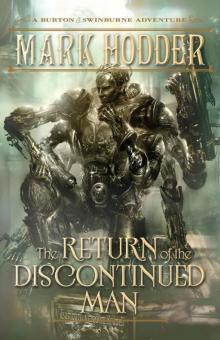 The Return of the Discontinued Man
The Return of the Discontinued Man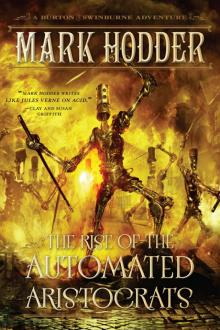 The Rise of the Automated Aristocrats
The Rise of the Automated Aristocrats Macallister Fogg 2: Great Great Great (And So Forth) Uncle Dragoslav
Macallister Fogg 2: Great Great Great (And So Forth) Uncle Dragoslav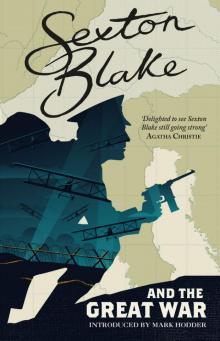 Sexton Blake and the Great War
Sexton Blake and the Great War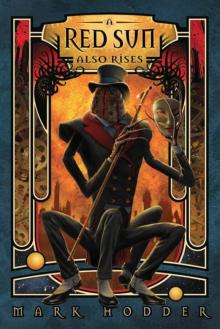 A Red Sun Also Rises
A Red Sun Also Rises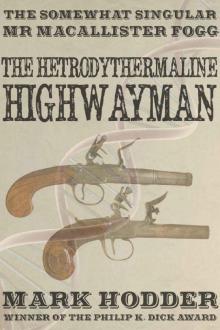 Macallister Fogg 3: The Hetrodythermaline Highwayman
Macallister Fogg 3: The Hetrodythermaline Highwayman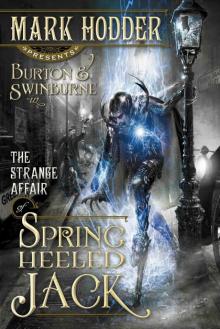 The Strange Affair of Spring Heeled Jack
The Strange Affair of Spring Heeled Jack Macallister Fogg 1: The Master Mummer's Mummy (The Adventures of Macallister Fogg)
Macallister Fogg 1: The Master Mummer's Mummy (The Adventures of Macallister Fogg)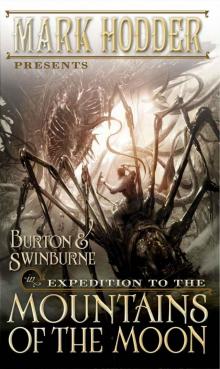 Expedition to the Mountains of the Moon bas-3
Expedition to the Mountains of the Moon bas-3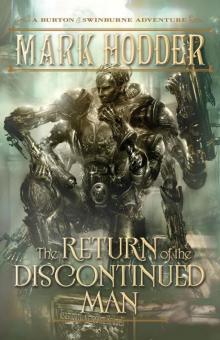 The Return of the Discontinued Man (A Burton & Swinburne Adventure)
The Return of the Discontinued Man (A Burton & Swinburne Adventure)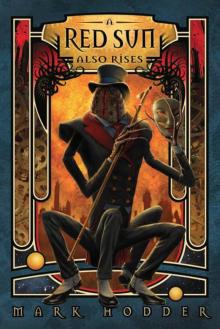 Red Sun Also Rises, A
Red Sun Also Rises, A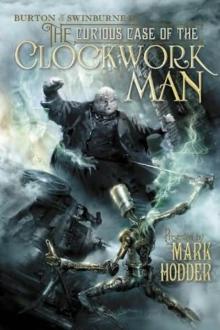 The curious case of the Clockwork Man bas-2
The curious case of the Clockwork Man bas-2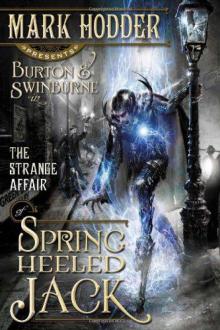 The strange affair of Spring-heeled Jack bas-1
The strange affair of Spring-heeled Jack bas-1